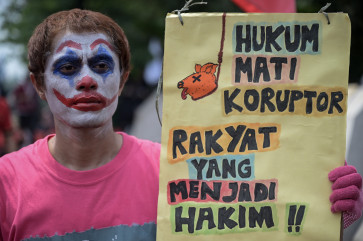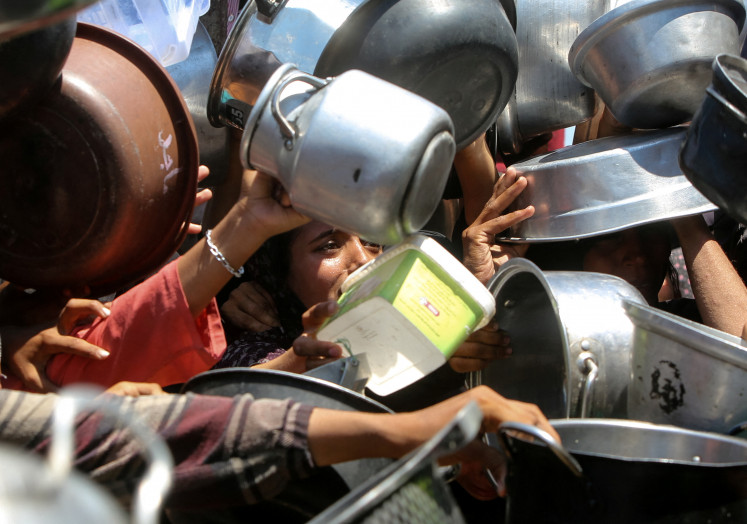Popular Reads
Top Results
Can't find what you're looking for?
View all search resultsPopular Reads
Top Results
Can't find what you're looking for?
View all search results‘Pagar Kawat Berduri’, a timeless look at independence
Instant classic: In a scene from the newly-restored film Pagar Kawat Berduri (Barbed Wire Fences), main protagonist in the movie Parman (Sukarno M
Change text size
Gift Premium Articles
to Anyone
I
nstant classic: In a scene from the newly-restored film Pagar Kawat Berduri (Barbed Wire Fences), main protagonist in the movie Parman (Sukarno M. Noor) negotiates with Major Koenen (Bernard Ijzerdraat) to fight for the prisoners’ freedom.(Courtesy of Education and Culture Ministry)
Pagar Kawat Berduri (Barbed Wire Fences) has long been an Indonesian cinematic classic and, thanks to the efforts of independent film collectives, the controversial film from the 1960s is now screening again.
A recent showing of Pagar Kawat Berduri at the Kineforum alternative cinema in Jakarta was not just another regular screening, because the classic film has been fully restored in all of its glory.
Directed by Asrul Sani, the film, which was released in 1961 and stars Sukarno M. Noor, Ismed M. Noor and Bernard Ijzerdraat, was only given a chance to appear on the silver screen for three days during its initial release.
The short screening period was because of major criticism by one of the biggest political parties in Indonesia at the time, the Indonesian Communist Party (PKI).
The PKI criticized the film for fostering sympathy for the colonial Dutch. Hence, further screenings of the film were banned.
At the end of 2017, the copy of the 56-year-old film was badly damaged. The Film Development Institute, in collaboration with Render Digital Indonesia, then attempted to restore it.
Based on the previous restorations of classic Indonesian films, the process requires a large budget and intensive, lengthy efforts.
In 2016, to restore classic romantic comedy Tiga Dara (Three Girls) into 4K, it took SA Films 17 months and a budget of around Rp 3 billion (US$207,856).
The restoration process includes fixing or removing scratches, tears, bugs, fold marks, glue marks and fungi.
The 2012 restoration of Lewat Djam Malam (After the Curfew) took around two years and the National Museum of Singapore and the World Cinema Foundation spent around Rp 2.5 billion.
Restoring Pagar Kawat Berduri required 100 days of work and cost around Rp 2 billion. The restoration process successfully fixed 170,000 damaged film frames, thus allowing the film to be screened in high quality.
The story of the film is set during Indonesia’s revolutionary war against the Dutch. It revolves around an Indonesian soldier, Parman (Noor), who tries to escape from a Dutch camp with his fellow comrades after being caught as hostages.
As the others try to escape, Parman chooses to be friendly with Koenen (Bernard Ijzerdraat), a Dutch officer, as a plan to gain his sympathy and persuade him to let them go. This plan, however, takes a heavy toll on Parman as his friendliness with the Dutch results in several conflicts between him and his comrades.
Considered by many as Asrul’s greatest work, the film has a strong plot, great directing and versatile camera work for its era.
According to film enthusiast and expert Hikmat Darmawan, the most prominent elements of the film are its strong themes and ideas and how Asrul conveys them.
“It is brilliant how the issues that the film raised in 1963 are still relevant to this day, it transcends time,” Hikmat said.
Hikmat stated that what separated Pagar Kawat Berduri from other nationalist-themed Indonesian films was how the film covered different perspectives on what independence was.
Unlike the one-dimensional approach of typical revolutionary films in which Indonesian soldiers fight against the “heartless” Dutch, Hikmat said Pagar Kawat Berduri showed how each individual, whether holding an Indonesian or Dutch perspective, had their own definition of freedom. This makes Pagar Kawat Berduri more humane and very relatable even to this day.
Hikmat also praised Asrul’s ability to add humor and romance to a noir film that explored a serious topic. Hence, it allows the audience to be relaxed at times throughout the film.
After the film was restored, Kineforum, with support from the Indonesian Film Board (BPI), screened it in its small-scale cinema from Dec. 18 to 23.
“We showed this film because it is an Indonesian film that is important in terms of its content and its historical value,” Kineforum manager Poetra Rizky Harindra said.
“Content-wise, it’s unique because it has a universal humanitarian value, a type of humanity that is portrayed disregarding race and nationality.”
Kineforum has also screened other restored classics, including Tiga Dara, Darah dan Doa (Blood and Prayer), Enam Djam di Djogdja (Six Hours in Jogja), Pedjuang (Warrior) and Kereta Api Terakhir (The Last Train).
Kineforum, as an alternative cinema venue, plans to continue screening restored Indonesian classics for years to come.
“Classic films are important cultural assets and also can be study materials for various film disciplines,” Poetra said.
The writer is an intern at The Jakarta Post










